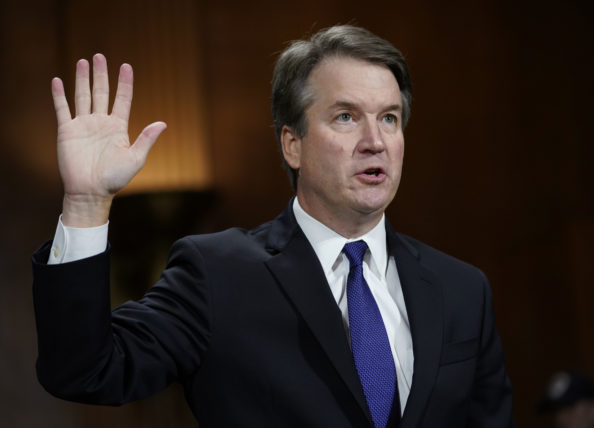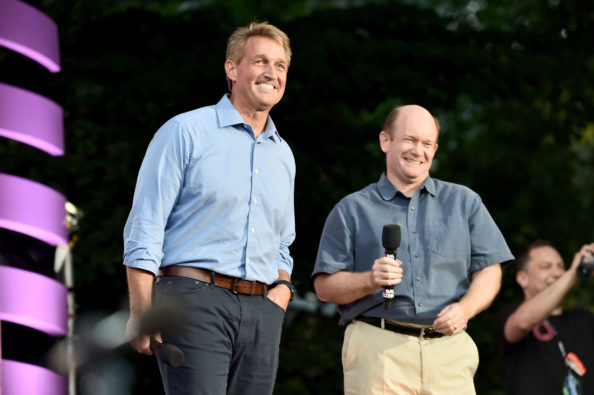WASHINGTON, DC – SEPTEMBER 27: Supreme Court nominee Brett Kavanaugh is sworn in before the U.S. Senate Judiciary Committee of at the Dirksen Senate Office Building on Capitol Hill September 27, 2018 in Washington, DC. Dr. Christine Blasey Ford, a professor at Palo Alto University and a research psychologist at the Stanford University School of Medicine, has accused Kavanaugh of sexually assaulting her during a party in 1982 when they were high school students in suburban Maryland. (Photo by Andrew Harnik-Pool/Getty Images)
“It didn’t need to be this way.”
“It didn’t need to happen like this.”
We heard these words spoken many times this past week, from leaders on both sides of the political aisle.
Seen another way, something like this was inevitable. It was born out of a national rupture that Brett Kavanaugh can now worsen, or take a step to repair. Like so many leadership moments, this situation was not of his choosing. That doesn’t diminish his platform to lead.
It’s Not About You
In his fiery speech during the Senate Judiciary Committee hearing, Senator Lindsey Graham said, “What you want to do is destroy this guy’s life.” He seems to think this debate is about the life of Brett Kavanaugh. Likewise, in his own opening statement, Kavanaugh said, “You may defeat me in the final vote but you’ll never get me to quit. Never.” He also sees the situation as a battle of wills over his personal success. This view misses the mark.
Moments like this are always bigger than the story of one person. Compare Kavanaugh’s words to those of the late John McCain in the closing of his Presidential concession speech. “Americans never quit. We never surrender. We never hide from history. We make history.” Both men had risked losing the central ambition of their careers. One saw that loss in personal terms and the other in a historical context. McCain understood that in watershed moments, great leaders put their own interests to the side to serve something bigger than themselves.
History hovers over the current proceedings, going back to Clarence Thomas and Anita Hill. The acute national heartbreak of the last few days began almost precisely two years ago, the day the country heard the Access Hollywood tape. It was then, and through the election that quickly followed, that the rupture opened that later led to the Me, Too movement. That’s one reason this nomination is so much bigger than Kavanaugh. It personifies unresolved perceptions that abused women won’t be believed, and that men will face false allegations made for devious partisan reasons.
It’s also why an FBI investigation can’t resolve this. The country is grappling with a fracture in the spine of the republic. We can barely keep standing. Facts won’t help because the hearings speak to questions plaguing the country on both sides of the red and blue divide. Does the other side care about me? Will they treat me with dignity and respect? Does my pain matter to them? Kavanaugh has a significant opportunity for leadership precisely because this conflict isn’t only about what did or didn’t happen between Dr. Ford and him.
Leadership is Symbolic
Leadership at the highest level is symbolic. The Supreme Court exemplifies that principle. Sandra Day O’Connor played a crucial role on the court as a “swing vote.” But first and foremost, she’ll always be known as the first woman to serve on the Supreme Court. Supreme Court justices are “larger than life” because they belong to the common story of America. Oliver Wendell Holmes. Earl Warren. Louis Brandeis. Thurgood Marshall. Antonin Scalia. John Roberts. Sonia Sotomayor. Even when people lose their nomination bid like Robert Bork and Merrick Garland, they still figure in the American journey.
On Saturday night, Jeff Flake and Chris Coons embraced the chance to exercise leadership by appearing together at the Global Citizens concert in New York. They introduced themselves as “a Democrat from Delaware” and a “Republican from Arizona.” In taking the stage together, and listing issues they both care about, they presented a vision for the country to move forward in a united way. On the day after the contentious vote, they represented the idea that across party lines, friendship and even governing together are still possible. The moment is bigger than those two individuals, and they know it.
Imagine if a dozen pairs of Senators, each made of one Democrat and one Republican, stood on a stage together. Better yet, imagine a photograph on the Capitol steps of 50 pairs like that. The whole Senate. It wouldn’t mean they’d vote together. It would affirm a belief that we’re all in this together. Picture the reaction if this photograph were published on the front page, or the homepage, of every newspaper in the country. A step like this would lessen the intense focus on the FBI investigation, as well as the attachment to the outcome. That’s because symbolic action can calm the waters of a collective undertow.
Brett Kavanaugh’s Leadership Opportunity
Some people commented last week that if Kavanaugh had been nominated in a different era, he easily would have been confirmed. That point misses an essential truth about leadership, expressed poignantly by Catholic monk and teacher Thomas Merton.
“Humans have a responsibility to their own time…a responsibility to find themselves where they are, in their own proper time and place, in the history to which they belong and to which they must inevitably contribute either their response or their evasion.”
Kavanaugh had the floor to make his case and to clear his name. He can leave it to the FBI now to bring facts that back him up. If they did, he could then claim victory for himself. But what would that do for the country?
Another option he has is to call off the FBI investigation with a message aimed at softening the polarization that defines these times. He could say, in essence, any of the following:
• I don’t believe I did this, not one scintilla (to use his own word). However, I recognize the slightest possibility exists that I did and I don’t remember. That horrifies me and keeps me up at night. If I did anything remotely like this, to Dr. Ford or to anyone else, I am profoundly sorry.
• I’m innocent. I’ve proven that in my testimony. But this is far bigger than me. For a significant number of people, I’ve come to represent men who inflict abuse on women and then deny it ever happened. I’m stepping down as a public symbol that taking accountability for abuse matters.
• Lives get ruined by false accusations. I’m a fighter, and I’m proud that I stood up for myself. Lives get ruined by sexual assault. Dr. Ford is a fighter, and I’m glad she stood up for herself. Let’s take attention off of my nomination. Let’s focus where it matters, on teaching our kids these serious consequences, starting with our teenagers.
• I’ve prepared my whole life for this role. I’m not stepping aside because I think I’m not qualified. It’s for the sake of the country, because I see how it’s tearing us apart. Dr. Ford and I both value civic duty. This is mine. Thank you for considering me for this extraordinary opportunity to serve the common good.
Judge Kavanaugh has a chance to do the right thing. It won’t feel right for him personally. But he has one week left to accept the role history is offering him. I truly hope he does.
